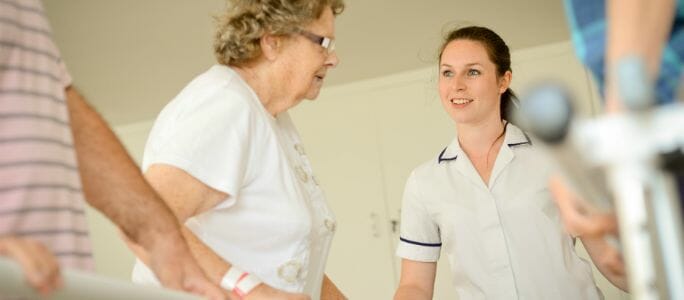For many people, hip replacement surgery transforms their quality of life, eliminates chronic pain, and increases mobility.
What to expect after hip replacement surgery
After your surgery, you may feel drowsy from the anaesthetic and experience some pain once you wake up. The nursing team will monitor you to ensure you are recovering well from the procedure.
A member of the physiotherapy team will visit you while you’re on the ward so that they can go through the initial exercises you need to do to aid your recovery. They’ll encourage you to start walking as soon as possible so that you’re able to keep your blood flowing and your joints moving.
Most people will be discharged after three days of rest in the hospital, but this will depend on how your body is initially recovering. Recovery can look different for different people — so don’t be disappointed if you can’t go home as soon as you’d like.
How long is recovery from hip replacement surgery?
Complete recovery from hip replacement surgery can take from a few months to up to a year. Recovery times vary from person to person. A number of things can affect how quickly you will recover from hip replacement surgery, including the type of surgery you have, your age, how active you are and any pre-existing health conditions.
It’s vital that during your recovery you stay physically active to ensure you keep your blood circulation up and strengthen the muscles around your new hip.
In the few days after your surgery, you’ll be encouraged to walk about, but keeping it at a slow pace. You’ll need to build up your stamina gradually, as doing too much too soon can set you back. A physiotherapist will be available to you to show you the types of exercises you need to be doing.
While you’re recovering for the first few days, you may feel extremely tired, but it’s crucial that you still keep up with your recommended exercises.

You might be eager to get back to your normal activities, but you do need to take it slow at first. However, you should be able to get back to light activities within six weeks. Everybody recovers differently though, and things like your age can impact how quickly you recover.
What to avoid after hip replacement
If you want to speed up your recovery, there are some things that you should avoid doing. Activities to avoid can include:
- Heavy lifting
- Lifting your knees up past your hips – this can dislocate the new joint
- Crossing your legs
- Driving – don’t do so until cleared by your doctor
- High-impact sports or strenuous physical activity
- Extremes of movement (such as squatting, sitting on low furniture, or getting into a bathtub)
While this may seem like a list of things you feel like you need to do, you could set your recovery back by doing them.
Hip replacement recovery tips
Having hip replacement surgery can greatly improve your quality of life and allow you to get back to doing the things you loved before hip pain took over.
A solid recovery plan is essential to your long-term recovery, so you need to make sure you follow any instructions given to you by your doctor, surgeon, or physiotherapist.
Prepare your home
Before you have your surgery, you’ll need to prepare your home so that you can recover easily. Things like moving furniture so that you can manoeuvre when you are using crutches or walking sticks can make a big difference. You want to reduce the risk of tripping over something indoors, so be sure to declutter, remove trip hazards and create clear pathways in your home.
As your mobility will be limited and cooking could prove to be challenging, preparing food before your surgery is a good idea. Try to plan some meals ahead of time, and freeze them for a later date. Make sure your fridge and freezer are stocked up with everything you could need so you won’t have to go out shopping for a while.
You may also want to think about putting your frequently used items in easily accessible places. For example, toiletries or food and drink can be moved onto lower shelves so you don’t have to reach up or moved higher so you don’t have to crouch down.
You might need to have a shower chair installed or other bathroom aids to help you keep yourself steady during your recovery.
Follow a physiotherapy plan and create an exercise routine
Physical exercise is very important for your recovery process, so you need to make sure you take the time in your day to do so.
Your physiotherapist will provide you with a list of exercises to do, which might include:
- Getting out of bed safely
- Moving and rotating the ankles
- Standing knee raises
- Climbing stairs
It is important to follow the exercise plan that your physiotherapist recommends to you, as this will ensure you protect your new hip, prevent blood clots and speed up your recovery. It may take you at least 12 weeks to be able to get back to your normal exercise routine, as you need to build up your stamina.
Some great exercises to do when recovering are walking, swimming, yoga, and even cycling, as they offer you a more gentle return to exercising. You can also read more about exercising after your hip replacement in our downloadable hip replacement guide.
Maintain a healthy eating lifestyle
Following a healthy, well-balanced diet will help to support your recovery process. Your doctor might advise you to take iron or other vitamin supplements to help your body repair itself easier. You might be asked to avoid foods high in vitamin K like broccoli or leafy greens for a little while, as they can thin the blood.
It’s best to avoid alcohol while you’re recovering, as you want to give your body the best chance possible of recovering fully. Too much alcohol could put you at risk of falling over as well, which is something you definitely want to avoid.
Make sure that you maintain a healthy weight by eating plenty of vegetables and protein, and cutting out processed foods that are high in saturated fats.
When to see a doctor
After your hip replacement surgery, you’ll need to keep an eye on your incision site and your health as a whole.
Make sure that you contact a doctor as soon as possible if you have any of the following symptoms:
- High fever with chills
- Redness or swelling around your wound
- Pain whether you’re active or resting
- Pain in your leg that’s not related to your incision site
- Severe swelling of the thigh, calf, ankle, or foot
- Increased pain in the new joint
These can be a sign of an infection or a blood clot, so you need to let your doctor know right away.
If you’ve got any concerns about your hip or want to explore the hip replacement treatments we have to offer, get in touch with us here at The Horder Centre. Our expert team will be able to provide you with expert advice and help you start your journey towards a solution.
What makes Horder Healthcare unique
Horder Healthcare is committed to providing the very best quality of care for our patients and customers. We are continuously working on improving and reducing risks and this is reflected in our consistently high CQC results, patient satisfaction questionnaires and minimal levels of infection.
We are a charity
We reinvest our profit to benefit more people and help us achieve our aim of advancing health.






